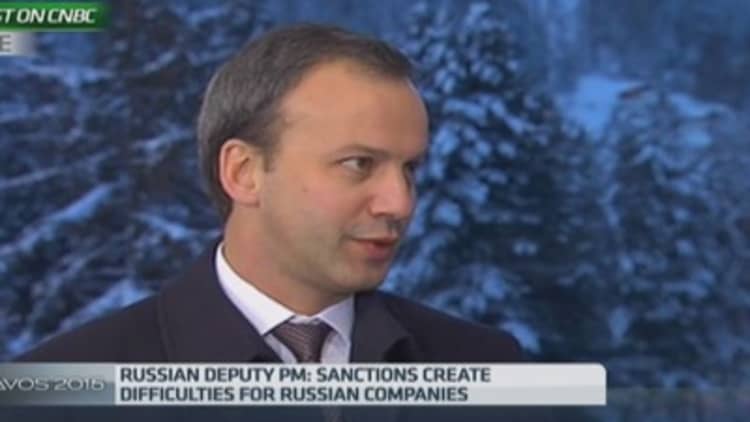
The conflict over Ukraine's borders with Russia, which has soured Moscow's relationship with the West and stirred up new concerns about global unrest, may be close to a "turning point", according to Arkady Dvorkovich, Russia's deputy Prime Minister.
"Russia is interested in stabilizing the situation globally and in Ukraine in particular," Dvorkovich told CNBC at the World Economic Forum in Davos, Switzerland, where he is one of Russia's most senior representatives after both President Vladimir Putin and Prime Minister Dmitry Medvedev declined to make the trip.
He extended the possibility of reducing the price of gas to Ukraine, after Russia hiked it earlier in the conflict.
This week, military activity in Donetsk and Luhansk, the disputed parts of eastern Ukraine where Russian-backed militants are battling the Ukrainian army, had escalated after falling back over Christmas and New Year.
Ukrainian forces under attack from Russian troops
Petro Poroshenko, the Ukrainian President, who came to power last year, has acknowledged this week that a military solution to the fighting, which has claimed nearly 5,000 lives so far, does not exist.

Economic sanctions enacted by Western countries against Russia, following the outbreak of conflict, combined with the falling price of oil and gas, its biggest export, and a tumbling ruble, have helped send the country into economic turmoil.
Nonetheless, Dvorkovich argued that thanks to the country's currency reserves "we have the resources to keep the economy in a relatively normal stance."
"We have resources, we have an anti-crisis plan."
Russian business also seemed to be striking a conciliatory note at the WEF event.
"Let's figure out, the business community together, how we can go beyond some of these political issues and really focus on restoring confidence and trust in each other," Kirill Dmitriev, chief executive of RDIF, the Russian government-backed investment fund, told CNBC.
"Russia needs to be connected to the world, and the world will be a better and safer place if it is."
There has also been a lack of external investment in Russia, as Western companies are concerned that they may fall foul of current or future sanctions.
But Dvorkovich dismissed this, arguing "CEOs of foreign companies are all saying that they will continue investments in Russia, with the ruble at this low level."






